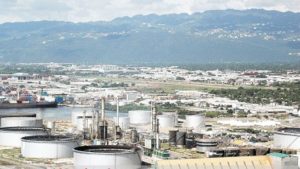
An aerial view of the Petrojam refinery.
Jamaica and Venezuela could well be headed for a confrontation next month over the ownership of the Petrojam refinery in Kingston.
Petrojam’s General Manager Winston Watson told a meeting of the House of Representatives’ Economy and Production Committee yesterday that the issue of the planned upgrade and expansion of the outmoded refinery will have to be decided by the end of October.
Asked by Opposition member Fitz Jackson what are Jamaica’s options if Venezuela fails to meet that deadline, Watson said the fact that PDV Caribe, a subsidiary of Petroleos de Venezuela (PDVSA), owns a 49 per cent share of the Jamaican oil refinery must be an incentive for it to seek to maximise and improve its investment in Petrojam.
However, he agreed with Jackson that, despite an agreement for the upgrade and the assurances from the Venezuelans, nothing has happened since PDVSA bought the shares in the local refinery in 2008 for US$63.5 million.
“We are looking that if they say no, then I guess we would have to go to the market and seek another investor,” he responded. However, he cautioned that such an option would involve “a more detailed process”.
Watson said that Jamaica has not gone into detailed questioning of Venezuela’s commitment to the agreement, but has done “soundings” and was satisfied with the response.
“We have asked, ‘Are you still interested in a refinery upgrade?’ And you get a response like, ‘yes’. But, now that we have the final information (reports), you don’t have any argument now, because you now have the data; so you either put up, or shut up,” he added.
Watson told the Economy and Production Committee Chairman Anthony Hylton that the refinery currently sells its products to the Jamaica Public Service Company (JPS). However, with the JPS scheduled to introduce Liquified Natural Gas (LNG)-powered plants in St James and St Catherine, the refinery will face a serious challenge in disposing of its heavy fuel oil (HFO), which takes up 45 per cent of its production and is sold mainly to the power company.
“Once the JPS switches to LNG, then we will have a problem disposing of our HFO,” he explained.
He said that the refinery has been exploring the selling of more oil to the bunker markets, and exporting as well.
“But, the truth is, you will have to convert the HFO, with some deep conversion, to make gasolene and more diesel and jet fuel,” he told the committee.
He pointed out that the expansion and upgrading of the refinery was planned to run concurrently with the JPS’s LNG project.
“In fact, Petrojam was ahead of the JPS in this in terms of the plans, and even the design and work we have done. We were ahead, but they have surpassed us,” he said.
Asked by Hylton what was the risk to the refinery’s assets, he said that the refinery might go into a “terminal mode”, “because once you can’t dispose of your off take, you’re going to have a problem”.
He said that, if the improvements were achieved, the refinery would meet Jamaica’s requirement of 48,000 to 50,000 barrels of oil daily.
“So, we would essentially be able to produce all the products Jamaica requires from a shipment of crude oil, and it meets the environmental standards. We are importing ultra sulphur diesel oil, we would be able to reproduce that… We would be saving in the region of US$300 million or so with our import substitution as well as job creation,” Watson said.
The refinery position was made known to the House committee which was probing the island’s renewable and alternative energy issues nearly four months after Prime Minister Andrew Holness met with Venezuelan President Nicolas Maduro at Jamaica House in Kingston on the issue.
Holness said after that meeting that he had narrowed down a final decision on the issue to three months and was pursuing it with “all the seriousness and alacrity” needed.
However, the Venezuelan Government seemed to have preferred a four-month “window for a decision”, as Watson informed the committee that experts from PDVSA would be coming to Jamaica next week to pursue those negotiations.
Watson said he was convinced that a decision would be reached by the end of October.
Petrojam is owned 51 per cent by the Government of Jamaica, through the Petroleum Corporation of Jamaica.
The Petrojam refinery has the capacity to refine 36,000 barrels of oil per day, but Jamaica had wanted to grow that capacity to 50,000 barrels under a project that would also position the plant to refine heavier and cheaper crudes.
According to an environmental report submitted to the planning authority about six years ago, an engineering study completed in 2008 had determined that the project would require US$758 million in capital funds that Jamaica lacked.
The alternative plan was for Caracas to take an additional two per cent stake, and therefore majority control in Petrojam also faltered.
Petrojam imports about nine million barrels of crude per year, mostly under concessionary terms from Venezuela. It also imports refined products as needed.
There has been speculation since early 2015 that Chinese investors are interested in purchasing the Venezuelans’ 49 per cent.
Asked about that last year, the then minister of energy, Phillip Paulwell, said, “I think that they might be looking at it closely, but I won’t say much more than that.”
